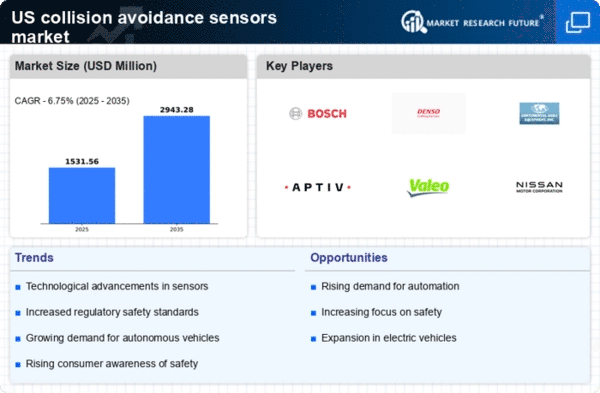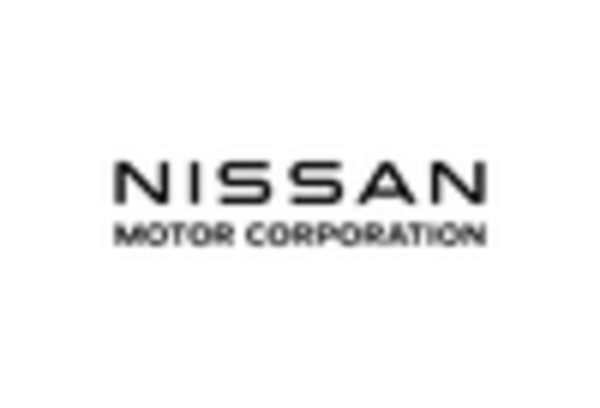Increasing Road Safety Awareness
The collision avoidance sensors market is experiencing growth. This growth is driven by heightened awareness regarding road safety among consumers and regulatory bodies. As traffic accidents continue to pose significant risks, there is a growing demand for advanced safety features in vehicles. This awareness has led to an increase in the adoption of collision avoidance systems, which are designed to prevent accidents by detecting potential hazards. In the US, the National Highway Traffic Safety Administration (NHTSA) has reported that collision avoidance technologies could reduce crashes by up to 30%. Consequently, manufacturers are investing in innovative sensor technologies to meet consumer expectations and regulatory requirements, thereby propelling the collision avoidance-sensors market forward.
Government Mandates and Incentives
Government mandates and incentives play a crucial role in shaping the collision avoidance-sensors market. In the US, regulatory agencies are increasingly implementing policies that require the inclusion of collision avoidance technologies in new vehicles. For instance, the NHTSA has proposed regulations that would mandate automatic emergency braking systems in all passenger vehicles by 2025. Such regulations not only enhance vehicle safety but also stimulate market growth by encouraging manufacturers to invest in sensor technologies. Additionally, various state-level incentives for electric and autonomous vehicles further promote the adoption of collision avoidance systems, thereby driving the collision avoidance-sensors market.
Rising Demand for Autonomous Vehicles
The rising demand for autonomous vehicles is significantly influencing the collision avoidance-sensors market. As automakers and technology companies invest heavily in the development of self-driving cars, the need for sophisticated collision avoidance systems becomes paramount. These systems are essential for ensuring the safety and reliability of autonomous vehicles, which are expected to account for a substantial share of the automotive market in the coming years. According to industry forecasts, the autonomous vehicle market could reach a valuation of $800 billion by 2035, with collision avoidance technologies being a critical component. This trend is likely to drive innovation and investment in the collision avoidance-sensors market.
Technological Innovations in Sensor Technologies
Technological innovations in sensor technologies are a key driver of the collision avoidance sensors market. Advancements in radar, lidar, and camera systems are enhancing the capabilities of collision avoidance systems, making them more effective in detecting obstacles and potential hazards. The US market is witnessing a rapid evolution in sensor technology, with companies investing in research and development to create more accurate and reliable systems. For instance, the integration of artificial intelligence and machine learning algorithms is improving the performance of these sensors, enabling them to adapt to various driving conditions. As these innovations continue to emerge, the collision avoidance-sensors market is expected to grow, driven by the demand for cutting-edge safety solutions.
Integration of Advanced Driver Assistance Systems (ADAS)
The integration of Advanced Driver Assistance Systems (ADAS) is a pivotal driver for the collision avoidance sensors market. These systems utilize a combination of sensors, cameras, and radar to enhance vehicle safety and facilitate semi-autonomous driving. The US automotive industry is witnessing a surge in the incorporation of ADAS features, with a projected market growth of approximately 20% annually. This trend is largely attributed to consumer demand for enhanced safety and convenience, as well as the competitive landscape among automakers striving to differentiate their offerings. As ADAS becomes more prevalent, the collision avoidance-sensors market is likely to expand, driven by the need for sophisticated sensor technologies that support these advanced systems.
















